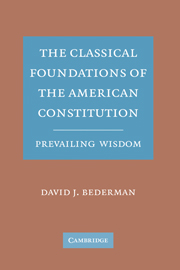3 - Constitution-Making and Ancient History
Published online by Cambridge University Press: 25 July 2009
Summary
As is abundantly clear from their voices quoted in chapter 2, the Founders were preoccupied with endowing substantial competence to the new general government of the United States. At the same time, the Framers of the structural Constitution were positively obsessed with cabining and controlling the exercise of governmental authority. This meant preventing the accumulation of power in any one branch of the federal government, protecting the prerogatives of the individual states, and (most difficult of all) ensuring that no particular social segment or cohort gained at the expense of the common weal. Government, as Alexander Hamilton observed, had to be poised on a knife-edge by having “[p]ower [be made] always the rival of power.”
The control of power was thus regarded by the Framing generation as being intimately related to the preservation of individual liberty. At this level of inquiry, there was a fundamental unity between the “structural Constitution” of the first seven articles of the national Charter and the “rights Constitution” of the Bill of Rights' ten amendments. Indeed, the distinction between these two aspects of American constitutionalism may be an utter fiction. After all, the Tenth Amendment provides a central tenet of federalism in its reservation of state powers. Moreover, the main body of the Constitution not only explicitly provides the affirmative legislative powers of Congress (and, by implication, of the national government), but specifically prohibits the general government from legislating against the “Privilege of the Writ of Habeas Corpus,” commands that “No Bill of Attainder or ex post facto Law shall be passed,” and ensures that no “religious Test shall ever be required as a Qualification for any Office or public Trust under the United States.”
- Type
- Chapter
- Information
- The Classical Foundations of the American ConstitutionPrevailing Wisdom, pp. 95 - 175Publisher: Cambridge University PressPrint publication year: 2008



